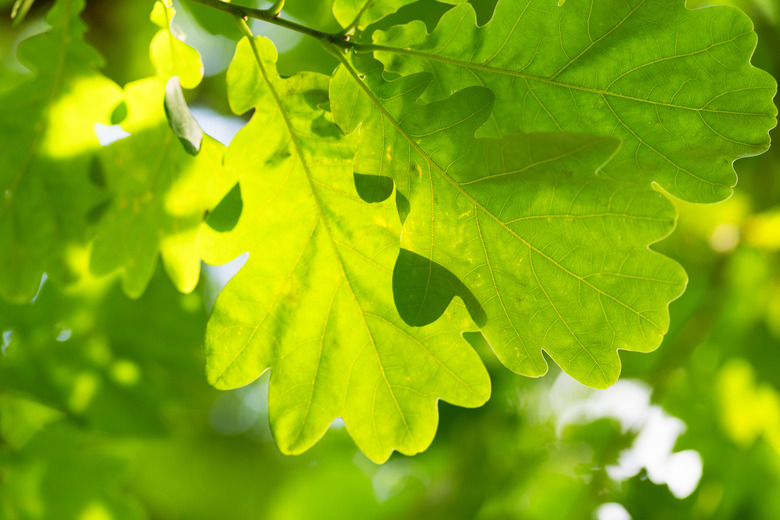How Do Oak Leaves Affect pH?
We may receive a commission on purchases made from links.
Oak (Quercus spp.) leaves are beautiful as they twirl from the tree branch and land softly on your lawn... but what happens next? These leaves are acidic, which is why homeowners often wonder about how oak leaves affect the pH of their soil. The pH of oak leaves changes and gets closer to neutral as they break down, so it's unlikely that these fallen leaves will have much of an effect on your soil.
Tip
Oak leaves are acidic when they first fall and become more neutral as they break down. Oak leaves affect the pH of your soil only minimally because they stay acidic for such a short time after falling from the tree.
Understanding the pH Scale
Understanding the pH Scale
Before you can understand how the leaves of an oak tree affect the pH of your soil, it's important to understand what the pH scale is. It determines the acid and alkaline levels in soil, and ranges from 0.0 to 14.0. Neutral soil measure 7.0 on the pH scale. Acidic soil has a pH level between 0.0 and 6.9, while any pH readings between 7.1 and 14 are alkaline. Soil pH matters because it affects how well different plants will flourish there.
Acidity of Oak Leaves
Acidity of Oak Leaves
When an oak leaf first falls from a tree, the pH of the leaf is acidic. Freshly fallen oak leaves have a pH between 4.5 and 4.7, depending on the cultivar. Oak leaves added to the soil in their freshly fallen state lower the pH of the soil — only somewhat. Unfortunately, the addition of oak leaves is not as effective as adding a modifier such as sphagnum moss. In addition, any acidity that does leach into the soil neutralizes quickly.
The longer the oak leaves remain in the soil, the more alkaline they become. Because the acidity of freshly fallen oak leaves is short lived, they are ineffective as pH modifiers. For instance, soil that has a pH of 7.0 or above is not adequate for plants that require an acid soil. Adding fresh oak leaves to the broken soil may satisfy the plants for a short while, but over time the plants will fail to thrive as the oak leaves begin to decompose and the soil pH rises.
Don’t Skip the Fertilizer
Don't Skip the Fertilizer
Like all organic matter, oak leaves eventually decompose in soil. This decomposed matter or "organic mulch" serves as food for micro-organisms that live within the confines of the soil. As the micro-organisms feast on the decomposing oak leaves, the pH of the leaves begins to rise and nitrogen levels in the soil fall. Plants that depend on this nitrogen will succumb to soil deficiency. The addition of a nitrogen fertilizer makes up for this loss.
How Oak Leaves Help
How Oak Leaves Help
Despite their inability to adequately acidify soil, oak leaves are highly beneficial. Decomposing oak leaves help balance soil temperatures within a comfortable range for microorganisms. Plants thrive in loose soil and the higher the microorganism populations, the more granular the soil. Oak leaves also work well as mulch, serving as an insulator that protects plant roots against fluctuating air temperatures. If you have an oak tree with broad leaves, it's best to chop the leaves before using them as mulch because a thick layer of broad leaves can form a mat, which blocks water from reaching plant roots. Applied immediately after watering, oak leaf mulch will also improve water retention in the soil.
